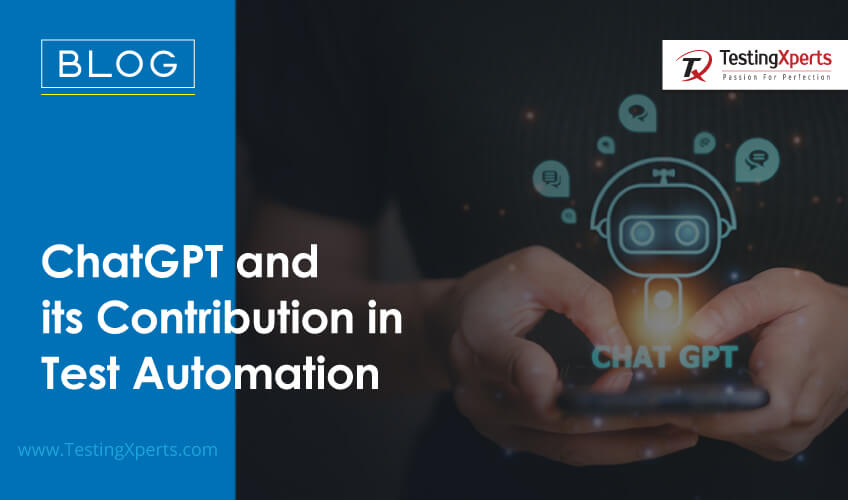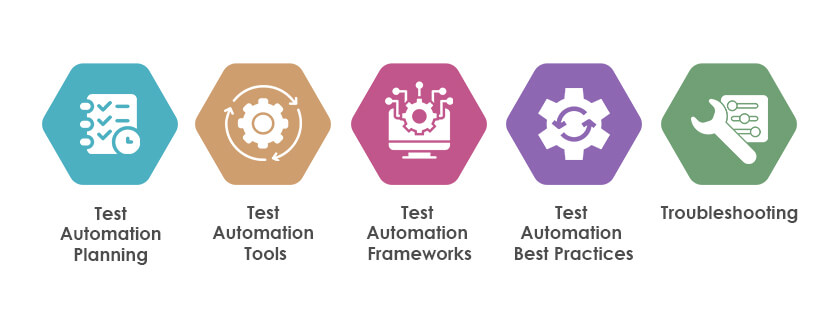Recommended Blogs
ChatGPT and its Contribution in Test Automation

- What is ChatGPT?
- ChatGPT and Automated Testing
- Can ChatGPT Generate Code for Use in Automated Testing?
- Improving Software Testing with the use of ChatGPT
- Using ChatGPT for Low code Testing
- Downsides of ChatGPT for Automated Testing
- Can ChatGPT assist in Test Automation?
- Will ChatGPT Replace Testing Teams?
ChatGPT broke all internet records by reaching a million users in just 5 days of its launch. A conversational AI that can answer all-natural language-based questions, write codes, create social media posts, write long essays and do a lot of amazing things. The key aim of the platform in the UK and all over the world is to make the lives of mobile and web users easier. However, the question is how to use this amazing AI-based platform to help mobile and web app testers. And, most importantly, how can ChatGPT contribute to automated testing?
What is ChatGPT?
ChatGPT is a large language model developed by OpenAI. It’s a part of the GPT (Generative Pre-trained Transformer) family of models, specifically GPT-3.5 architecture, which is designed to generate human-like text based on a given prompt or input.
Its key purpose is to engage in conversations with users, answer their questions, and provide helpful information. The platform is trained on a massive amount of text from the internet, which allows the software to understand a wide range of topics and provide informative responses.
ChatGPT and Automated Testing
As an AI language model, ChatGPT is not directly involved in software development or automated testing in the United Kingdom (UK) and worldwide. However, as a language model that is designed to interact with humans, ChatGPT can be used to generate test cases and test data for automated testing systems.
In addition to this, ChatGPT can offer information and insights on testing best practices and techniques, as well as assist with documentation and communication within testing teams.
When we say ChatGPT test automation, it is about using ChatGPT to perform automated testing tasks such as regression testing, integration testing, and performance testing. For example, ChatGPT enables functional test automation to test the functionality of a web application by simulating user interactions and checking that the application responds correctly to various inputs.
But offering the codes that look accurate is just the start. ChatGPT and test automation go hand-in-hand. Ideally, ChatGPT is expected to provide the tests to generate. It would share all the details about the website version and generate perfect executable code that needs no changes. ChatGPT right now can’t do that but what it can do is still a lot though.
Let’s begin with a use case for ChatGPT for test automation, not to replace testing experts, but rather as a new low—coding method.
Can ChatGPT Generate Code for Use in Automated Testing?
As an AI language model, ChatGPT is capable of generating code for a variety of tasks.
Imagine you’re a software developer who just finished building a new feature for your application, and you want to ensure that it works as expected. Rather than manually testing the feature, you can use automated testing to automate the process and run tests repeatedly, catching any bugs or issues before they make it to production.
That’s where ChatGPT in test automation comes in. With its expertise in natural language processing and machine learning, it can generate test code that covers various scenarios and inputs, helping you ensure that your software is working as intended. Whether you need unit tests, integration tests, or end-to-end tests, it can generate code that fits your needs and specifications for ChatGPT software testing.
Below are a few possible use cases listed of ChatGPT in automated testing:
• Automating any test scenario
• Use CI/CD to build a complex test automation pipeline
• Use microservices for testing any application
• With detailed instructions for using the generated code, ChatGPT automation allows one to decode the code easily. Being a low-code tool, ChatGPT can also bring in code using the cucumber testing framework (on the basis of behavior-driven development of BDD).
Now, let’s dig more into ChatGPT and software testing.
Improving Software Testing with the use of ChatGPT

Here are some of the common QA activities that ChatGPT can perform:
As an AI language model, it can provide some suggestions on how you can potentially improve software testing:
Test Case Generation:
ChatGPT can help in generating test cases for your software based on the given specifications. By feeding the system with the requirements, it can generate test cases that ensure that the software meets those requirements.
Test Data Generation:
ChatGPT in automation testing can also help in generating test data for your software. By providing the system with the input parameters and their expected output, ChatGPT can generate the necessary data to test the software’s functionality.
Exploratory Testing:
ChatGPT can assist in performing exploratory testing, which is an unscripted and ad-hoc testing method. By leveraging its natural language processing capabilities, ChatGPT can help testers in exploring the software’s functionality and identifying any defects.
Test Automation:
By performing test automation with ChatGPT, it can help in automating the testing process. By leveraging its machine learning capabilities, it can learn from the manual testing activities and generate automated test scripts that can be used to test the software continuously.
Bug Prediction:
ChatGPT can also assist in predicting potential bugs in the software. By analyzing the code and the testing data, it can provide insights into the areas that are more likely to have defects, allowing testers to focus their efforts on those areas.
Using ChatGPT for Low code Testing

Low code testing involves testing applications built using low code development platforms that enable developers to build applications without writing a lot of code. These platforms often provide drag-and-drop interfaces, pre-built components, and other features that make it easier to build applications quickly.
Here are some ways ChatGPT can help with low code testing:
Test Case Generation:
ChatGPT can generate test cases automatically based on user requirements, specifications, and other inputs. It can analyze the low code application and provide test cases that cover all possible scenarios.
Test Data Generation:
ChatGPT can also help generate test data for low code applications. It can create test data based on different scenarios, such as positive and negative test cases, edge cases, and more.
Test Execution:
ChatGPT can execute test cases for low code applications and provide detailed reports on the results. It can identify issues, provide recommendations for fixing them, and ensure that the application meets the user’s requirements.
Code Analysis:
ChatGPT can analyze the code of low code applications and identify issues such as security vulnerabilities, performance issues, and more. It can provide recommendations for fixing these issues and ensure that the application is secure and performs well.
ChatGPT can be a valuable tool for low code testing, helping developers ensure that their applications are robust, reliable, and meet the user’s requirements.
Downsides of ChatGPT for Automated Testing
In a very limited time, ChatGPT has shown a lot of promises in the case of low-code tools for automated testing.
Regardless of its benefits, ChatGPT for software testing has its share of limitations, which include the following:
• The platform does not implement the application code being tested itself. ChatGPT testing tool thus cannot decide if the generated code is achievable.
• ChatGPT cannot identify the despised methods – nor does it have an effective way to correct the issue.
• ChatGPT usually uses common page structures in its generated code. The users, therefore, need to pick out the issue to request an updated code version.
Despite these limitations, ChatGPT has very good potential as a low-code solution for automated testing. However, it is required that QA testers use this AI model after completely understanding the programming language used and the application under test.
Can ChatGPT assist in Test Automation?

ChatGPT can help with test automation. As a language model, it can provide guidance and suggestions on test automation strategies, tools, and best practices.
Here is how ChatGPT can help with test automation:
Test Automation Planning:
ChatGPT can assist with test automation planning by providing recommendations on which tests are best suited for automation, identifying potential test automation frameworks, and suggesting how to integrate automation into the development process.
Test Automation Tools:
ChatGPT can help in selecting the right test automation tools based on the project’s requirements, providing a comparison between different tools, and offering advice on how to evaluate tools effectively.
Test Automation Frameworks:
ChatGPT can suggest popular test automation frameworks and advise on the best framework to use for a particular project.
Test Automation Best Practices:
ChatGPT can help with providing best practices for test automation, such as creating maintainable test scripts, managing test data, and dealing with flaky tests.
Troubleshooting:
ChatGPT can help in identifying and troubleshooting issues with test automation scripts, such as debugging failing tests or identifying bottlenecks in the test execution.
Will ChatGPT Replace Testing Teams?
As a code generation tool, ChatGPT is comparatively the most powerful tool for generating natural language. Since it is new to the market, ChatGPT algorithm may take some time to mature fully. This cannot be trusted completely for performing automation testing. In addition to this, written test cases from ChatGPT cannot be taken as 100% right.
To sum this up, ChatGPT for automation testing is a good idea, however, it is not mature enough to replace AI-based test automation.
How is TestingXperts offering AI and Automation Testing Services in the UK?
ChatGPT QA can be the next big thing, as low-code testing is becoming an effective aspect of testing that needs to be included in every product team’s plan. It makes space for less technical users to get more embroiled with the software delivery lifecycle, permitting a culture of quality to be unlocked across the organization. Since there is a lot of value from other forms of testing like unit and integration testing, it can be limited by the number of trained engineers on hand and time required to complete end-to-end testing.
Discover more
